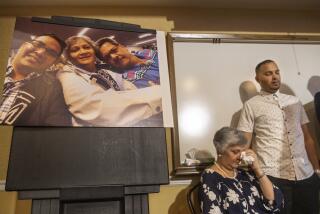Judge Voids Sanity Phase of Naddi Murder Trial
- Share via
A prosecutor’s remarks about the murder of a U.S. hostage in Lebanon, characterized by a judge as “prejudicial,” led the judge to declare a mistrial Wednesday in the sanity phase of a case involving a Lebanese man charged with killing five family members.
The decision means a third trial will now have to be convened to determine whether Toufic Naddi, 48, of El Cajon was sane or insane when he gunned down his wife, her parents, and two other relatives on June 1, 1985, in El Cajon.
Convictions Unaffected
The mistrial has no effect on Naddi’s convictions for committing five first-degree murders.
The motion for a mistrial was brought by Naddi’s attorneys, Hodge Crabtree and Beverly Barrett, who objected to remarks made by Deputy Dist. Atty. Robert Boles’ in closing arguments Tuesday.
Boles told jurors that Naddi made the decision to kill his family based on his concept that he was in the right, and it was “no different than the people who hung (Marine Corps Lt.) Col. (William Richard) Higgins last week.”
San Diego Superior Court Judge Terry O’Rourke said the remarks were “an irresponsible reference” that included “an unjustifiable appeal to ethnic or racial prejudice.”
The judge grilled the prosecutor as to why he alluded to the killing in Lebanon, knowing that the defendant is from Lebanon.
“I just don’t see the logic of your argument,” O’Rourke said. “You don’t know anything about the hanging of Col. Higgins. . . . Were you there?”
“No,” Boles replied.
The judge said there was a retired Army colonel on the jury as well as two other armed services members that Boles’ arguments could have inflamed.
Boles said he did not intend to make any prejudicial remarks and was making a comparison between Naddi’s declared decision to kill his family because God ordered him to do so and the zealousness of terrorists in the Middle East who also cite the Almighty in justification of their acts.
Terrorism Link Denied
Boles told the judge he was not trying to tie Naddi to terrorists in Lebanon. He said he only wanted to compare the mental attitude of Naddi and the hostage-takers.
The judge also noted that Boles had remarked about Naddi’s belief in Allah, but that Naddi himself had testified he was a Roman Catholic.
Contacted afterward, Boles said, “Obviously, we disagree with the judge’s decision.” The remarks, Boles said, “could have been cured with an admonition (to the jury). We’re all sorry this happened.”
A retrial was set for Sept. 11.
If the jury finds Naddi was sane when he committed his crimes, the same jury would then hear evidence and later deliberate in a penalty phase to decide whether Naddi should be executed or sentenced to life in prison without the possibility of parole. If Naddi is found to have been insane, he would be committed to a state mental hospital.
Naddi’s victims were Aida Naddi, 26; her father, Habib Sabbagh, 73; her mother, Lillian Sabbagh, 58; her cousin, Michael Sabbagh, 38, and her brother-in-law, Osama Mashini, 38.
All of the victims were shot repeatedly in the head.
Jury Was Surprised
When the jury filed in and was told that a mistrial had been declared, a juror asked why. O’Rourke said it was because of “prejudicial remarks” by Boles. The jurors, which had sat for weeks hearing evidence, appeared disappointed and some of them looked angry.
The jury selection in this death penalty case will take at least six weeks, Boles estimated.
O’Rourke said he hopes the selection will begin Sept. 11.
The first mistrial occurred July 1, 1988, when the jury that convicted Naddi deadlocked 11 to 1 for finding that he was sane when he committed the murders.
More to Read
Sign up for Essential California
The most important California stories and recommendations in your inbox every morning.
You may occasionally receive promotional content from the Los Angeles Times.










